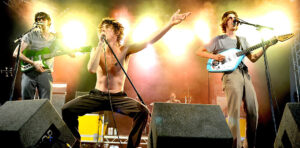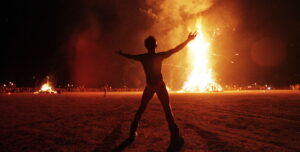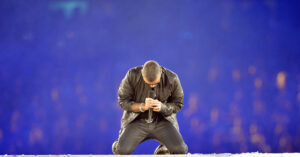Other than a dissection of abject narcissism, I’m no longer sure poetry has much to offer us. I think we’re losing our capacity to look outwards. The writing that interests me most now is about this crisis, this prolapsing of perspective. Looking anywhere other than inwards these days seems decadent to me. This wasn’t always the case. There was a time when titans roamed the earth. There were once shoulders broad enough to carry the entire mess of the human condition, and not once dare whine about the struggle endured.
When I first moved to London, I went searching for Shane. Literally, as well as metaphorically, spiritually, aesthetically. I found him, on each count. Where the former was concerned, at Highgate’s Boogaloo pub. I’d heard that’s where he was getting pissed at the time. I was an hour or two early, the place was still shut, but peering through the glass I could make out a bloke that looked just like Mr MacGowan asleep sprawled across the sofa. My god, could it be? I came back once it had opened, and sure enough there he was, propping up the bar surrounded by bevvy. People forever buying him drinks. The idea crossed my mind. Too shy. Also, he’s got enough drinks. I was skint, still at that point in my life where I’d bring my own cans to the pub to save dollar.
I’d loved The Pogues back in Ulster where I grew up. They’d long been a fixture in my household. I recall buying my mum the “Best Of” for Christmas one year, at her request. Weird that, when you’re a kid and you don’t have any money. Your parents choose the gift and pay for it. Sort of pointless. Anyway, I remember feeling confused at the sight of this snaggle-toothed fella on the sleeve clutching a guitar, grinning at me. There was an immediate difference between this guy and Take That or George Michael, my mum’s other favourites. He was imperfect, and proudly so by the looks of it. When I stuck it on the stereo the bafflement only thickened. This man could not sing. My mum wasn’t into punk rock. She was into pop music. Shane had crossed boundaries that, at the time, aged 10, I had no idea existed.
Once adolescence kicked in, it started to make sense. This wayward Irish rebel thing. This not being able to sing. Living in Ireland, though, I was just one among many. I preferred The Clash. It felt harsher, had fuzzy electric guitars, it therefore felt more real. I was on my way to London come hell or high water. London Calling was therefore my anthem.
Once I arrived, they switched places. I had to carve out an identity for myself in the Big Smoke. Irish. I was going to be thoroughly Irish. There weren’t many Irishmen at UCL. I took to drinking severely and listening to Red Roses for Me at a volume that nobody on campus could tolerate. I fell so deeply in love with Shane’s lyricism that, as my life slowly started to resemble one of his jovial nightmares, I took it to be a matter of pride, of authenticity. I wanted to step into one of those fables and remain there, where — impossibly — things going horribly wrong could somehow generate festivity.
My first attempt at a band — “The Saudi’s” — was more than just a little Pogues-inflected. I didn’t have a clue how to write a melody, but I fancied myself a wordsmith. If you lack a certain cynicism, once you become obsessed enough with a writer, you can’t help but fancy yourself a wordsmith. I would rewrite the words to tunes on Pogues records. An embarrassing first pass, I recall turning “Waxie’s Dargle” into “The Yardie from Killarney”, a song about the only other Irish-Algerian-Londoner I’d ever met.
That was my pal Ronnie, whose floor I was living on at the time, sharing a double mattress with my little brother after flunking out of uni. Ronnie had just come out of prison. This made him prime fodder for writing a Pogues-inspired tune, a second-generation immigrant ex-con. A perennial outsider. We used to spend our afternoons folding drug wraps for him out of lottery cards whilst listening to “Transmetropolitan”. Life can’t help but imitate art. Art has style — it’s seductive. When the evening rolled around, we’d terrorise east London loaded on Buckfast, a bottomless sack of cheap pingers at our disposal.
The band went nowhere. Well, almost nowhere. Spider Stacy, The Pogues’ tin whistle player, left a flattering comment on our Myspace page one time. I held onto this fact for years. It’s these fragments of acknowledgment that keep you buoyant through the deep tundra of namelessness. Spider was into it. It’s still possible. The follow-up project to that first band wound up sharing a stage with The Pogues in Thetford Forest roughly 10 years later. Shane was obviously long since passed his prime. He had a telly prompter for the lyrics, which I found pretty funny. Who doesn’t get the order of the verses muddled up on “Dirty Old Town”? They work whichever way you sling them. He’d do three or four songs then disappear backstage for a fag or a sit down, I’m not sure. There was still this glow, this presence, this living, breathing sense of history emanating from the dude.
What is it with the Irish and language? I am of course only a plastic paddy, or a cultural paddy in part. I was born in England, my mum’s from Yorkshire, my dad’s Algerian, but for the most part I grew up over there. Six years in Galway, six in Scotland, then another six in County Tyrone before moving to London at 18. Freud allegedly stated that the Irish were immune to psychotherapy, that you could divide the population of the world into two camps: people, and Irish people. I’m going to take a mutton-fisted stab in the dark and suggest that in Ireland, there’s less of a fixation on practicality where words are concerned. There’s an element of play in every lexicon, but with the mick, it’s proportionally off the chart. Maybe this is because it pisses it down all the time. With so much of life spent indoors, they have little choice but to turn everything that comes out of their mouths into a kind of game.
Splice this tendency with the unfortunate proximity to Imperial London and you have a recipe for a world-beating poetics of opposition. A poetics that can’t switch itself off. The contradictions in the national character come too thick and fast to settle on an answer. Hedonistic yet devout, thick-skinned yet suprasensual, foul-tempered yet stubbornly polite. Shane described it thus: “I’m following the Irish tradition of life, the human way of life. Cram as much pleasure into life and rail against the pain you have to suffer as a result. Or scream and rant with the pain and wait for it to be taken away with beautiful pleasure.”
Conflict is the engine of creativity. The Irish spirit has a greater capacity for irresolution than most. One need only look at the wild success of their diaspora to bolster this generalisation. In The Pogues, in the voice of Shane MacGowan, we hear this capacity at fever pitch, stretched to its ecstatic limit.
There is nothing beyond acceptance in his vernacular. An unequivocal affirmation of life in all its hoary, pernicious, astounding, violently glorious detail. Arch shit-stirrer Mark E. Smith criticised him on account of his being a peddler of “show tunes”. This is to miss the point entirely. It’s the familiarity of the sonic palette, the conservatism of it, crossbred with the surrealist hell-scapes of the vocal performance and lyrics that render it untouchable, if not exactly avant garde. The best writers reveal to us what we already know. Shane showed us a version of Irish history, and of the immigrant experience especially, which we all had a sense of regardless. What a relief to hear it rendered with such savage glee, honesty and compassion. He will be sorely missed.
Disclaimer
Some of the posts we share are controversial and we do not necessarily agree with them in the whole extend. Sometimes we agree with the content or part of it but we do not agree with the narration or language. Nevertheless we find them somehow interesting, valuable and/or informative or we share them, because we strongly believe in freedom of speech, free press and journalism. We strongly encourage you to have a critical approach to all the content, do your own research and analysis to build your own opinion.
We would be glad to have your feedback.
Source: UnHerd Read the original article here: https://unherd.com/




